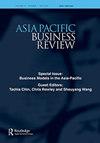The international strategy for Korean pop music: what makes K-pop listed on Billboard Hot 100?
IF 2
4区 管理学
Q3 BUSINESS
引用次数: 1
Abstract
ABSTRACT Based on a sample of most popular 300 K-pop songs between 2009 and 2021, we investigate why only 44 of them were listed on Billboard Hot 100 despite K-pop’s global popularity in terms of YouTube viewing clicks, streaming revenues from digital music platforms and international album sales. In tandem with the failure to receive any Grammy award by BTS even as their six songs had eventually made to the top position on the Hot 100 chart, the symbolic capital of K-pop in the US music market is all but reticent. Using the bootstrapping method based on the Process macro model for serial mediation effects, we find that the K-pop idol system (or the production system in Korea) negatively mediates the correlation between creative outsourcing and the rankings of Billboard Hot 100 and Spotify. However, signing contracts with global music labels positively mediates the same correlation. We provide implications of these findings.韩国流行音乐的国际战略:是什么让韩国流行音乐跻身Billboard Hot 100?
本文章由计算机程序翻译,如有差异,请以英文原文为准。
求助全文
约1分钟内获得全文
求助全文
来源期刊

Asia Pacific Business Review
Multiple-
CiteScore
4.40
自引率
13.80%
发文量
70
期刊介绍:
The growth of the Asia Pacific region and the rising presence of its multinationals in world markets has raised a number of questions about the origins of national economic success. Asia Pacific Business Review addresses these key issues and draws together the lessons of the analysis of culture, economies, history, politics and societies in the area, in order to explore business-related phenomena in the Asia Pacific countries, both in their general and specific contexts. The Review is intended for both academics and interested observers, contains the contributions of recognized experts, and is essential to anyone seeking the latest research on Asia Pacific business in a readily available, approachable form. We welcome articles which deal with nations and societies in the Asia Pacific region, namely those in East Asia and South-East Asia (but not South Asia), including those in APEC and ASEAN, individually or comparatively. Of interest also are contributions on the Asia Pacific economies, comparing those inside with those outside, or those investing in it. We do not, however, publish papers based solely on countries from outside the region.
 求助内容:
求助内容: 应助结果提醒方式:
应助结果提醒方式:


